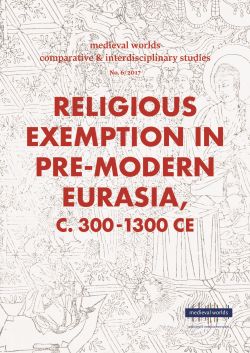 |
 |
Walter POHL – Andre GINGRICH (Eds.)
medieval worlds • no. 6 • 2017
Religious Exemption in Pre-Modern Eurasia, C. 300-1300 CE
Uriel Simonsohn
S. 196 - 216 doi: 10.1553/medievalworlds_no6_2017s196
Verlag der Österreichischen Akademie der Wissenschaften
Abstract:
The choice of individuals and groups to embrace Islam in the first few centuries after its emergence is rightfully considered an act that was charged with spiritual meaning. At the same time, however, the act also brought with it dramatic implications for the configuration of communities whose social and political structures were dictated by theological ideologies, scriptural traditions and memories of primordial pasts. In this essay, I wish to focus on the social aspects of conversion to Islam, particularly on how shifts in confessional affiliation were prompted by social concerns. Once they entered into the Islamic fold, the new converts were able to enjoy a variety of benefits and exemptions from burdens that had been imposed on them as non-Muslims. Yet conversion to Islam did not only offer exemption from taxes or liberation from slavery. In the final part of this essay, I attempt to show that conversion to Islam, or even its mere prospect, could be used for obtaining various favours in the course of negotiations for social improvement. An ecclesiastical authorization to divorce without legal justification, the release of a Jewish widow from her levirate bonds, and the evasion of penal sanctions are examples of some of the exemptions that were sought out or issued in response to conversion to Islam. In the period under discussion, in the context of a social setting that was founded on confessional affiliation, conversion to Islam signalled a social opportunity that was at times manipulated by individuals for the sake of improving their personal status.
Islam; ahl a-dhimma; conversion; jizya, slavery; mawlā; marriage; law; Jews; Christians Published Online:
2017/12/01 11:45:59 Object Identifier:
0xc1aa5576 0x00372f27
Rights:All rights reserved.For questions regarding copyright and copies please contact us by email.
MEDIEVAL WORLDS provides a new forum for interdisciplinary and transcultural studies of the Middle Ages. Specifically it encourages and links comparative research between different regions and fields and promotes methodological innovation in transdisciplinary studies. Focusing on the Middle Ages (c. 400-1500 CE, but can be extended whenever thematically fruitful or appropriate), MEDIEVAL WORLDS takes a global approach to studying history in a comparative setting.
MEDIEVAL WORLDS is open to regular submissions on comparative topics, but also offers the possibility to propose or advertise subjects that lend themselves to comparison. With a view to connecting people working on related topics in different academic environments, we publish calls for matching articles and for contributions on particular issues.
Table of Contents
Religious Exemption in Pre-Modern Eurasia, c. 300 – 1300 CE: Introduction
Charles West
Treasures in Heaven: Defining the Eurasian Old Regime?
R. I. Moore
Envisioning a No-Man’s Land: Hermitage as a Site of Exemption in Ancient and Early Medieval
Indian Literature
Kanad Sinha
Evolving Relationship between the Buddhist Monastic Order and the Imperial States of Medieval
China
Mario Poceski
The Normative Character of Monastic Exemption in the Early Medieval Latin West
Kriston R. Rennie
Clerical Exemption in Canon Law from Gratian to the Decretals
Anne J. Duggan
Nothing to Declare: Status, Power and Religious Aspiration in the Policies of Taxation in Ancient
India
Ulrich Pagel
Exemption Not Granted: The Confrontation between Buddhism and the Chinese State in Late
Antiquity and the ‘First Great Divergence’ Between China and Western Eurasia
Antonello Palumbo
The Political Significance of Gifts of Power in the Khmer and Mercian Kingdoms 793-926
Dominic Goodall and Andrew Wareham
Conversion, Exemption, and Manipulation: Social Benefits and Conversion to Islam in Late Antiquity
and the Middle Ages
Uriel Simonsohn
Religious Exemption, Justice, and Territories around the Year 1000: The Forgeries of Worms
Thomas Kohl
The Exemption that Proves the Rule: Autonomy and Authority between Alcuin, Theodulf and
Charlemagne (802)
Rutger Kramer
From Symbiosis to Separate Spheres? England, 1163
Judith A. Green
Religious Exemption and Global History before 1300 – Closing Comments
Julia McClure
|




 Home
Home Print
Print
 References
References
 Share
Share
